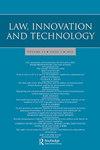Dis/similarities in the design and development of legal and algorithmic normative systems: the case of Perspective API
Q1 Social Sciences
引用次数: 4
Abstract
ABSTRACT For several decades now, legal scholars and other social scientists have been interested in conceiving of technologies as regulatory media and comparing their normative affordances to law’s regulatory characteristics. Recently, scholars have also started to explore the normative nature of Machine Learning and Artificial Intelligence systems. Most of this scholarship, however, adopts a largely theoretical perspective. This article takes a different approach and attempts to provide the discussion with a more factual grounding. It does so by investigating the construction of one particular Machine Learning system, the content moderation system Perspective API developed by Google. Its open-source development and a voluminous trove of publicly available documentation render Perspective API a virtually unique resource to study the inner logics of Machine Learning systems development. Based on an in-depth analysis of these logics, the article fleshes out similarities and dissimilarities concerning the normative structure of algorithmic and legal systems regarding four different subjects: practical constraints, evaluative diversity, modes of evolution and standards of evaluation. The article then relates the case of Perspective to the European Union’s proposal for an Artificial Intelligence Act and shows how the study’s insights might help in readying the Act for the realities of contemporary multi-party AI development.法律和算法规范系统设计和开发中的不一致/相似之处:透视API案例
摘要几十年来,法律学者和其他社会科学家一直致力于将技术视为监管媒介,并将其规范性可供性与法律的监管特征进行比较。最近,学者们也开始探索机器学习和人工智能系统的规范性。然而,这方面的研究大多采用了理论观点。本文采用了不同的方法,并试图为讨论提供一个更真实的基础。它通过调查一个特定的机器学习系统的构建来做到这一点,该系统是由谷歌开发的内容审核系统Perspective API。其开源开发和大量公开文档使Perspective API成为研究机器学习系统开发内部逻辑的一种几乎独特的资源。在对这些逻辑进行深入分析的基础上,文章从实践约束、评价多样性、进化模式和评价标准四个不同的主题,充实了算法和法律体系规范结构的异同。然后,这篇文章将Perspective的案例与欧盟关于《人工智能法》的提案联系起来,并展示了该研究的见解如何有助于该法为当代多方人工智能发展的现实做好准备。
本文章由计算机程序翻译,如有差异,请以英文原文为准。
求助全文
约1分钟内获得全文
求助全文
来源期刊

Law, Innovation and Technology
Social Sciences-Law
CiteScore
4.50
自引率
0.00%
发文量
18
期刊介绍:
Stem cell research, cloning, GMOs ... How do regulations affect such emerging technologies? What impact do new technologies have on law? And can we rely on technology itself as a regulatory tool? The meeting of law and technology is rapidly becoming an increasingly significant (and controversial) topic. Law, Innovation and Technology is, however, the only journal to engage fully with it, setting an innovative and distinctive agenda for lawyers, ethicists and policy makers. Spanning ICTs, biotechnologies, nanotechnologies, neurotechnologies, robotics and AI, it offers a unique forum for the highest level of reflection on this essential area.
 求助内容:
求助内容: 应助结果提醒方式:
应助结果提醒方式:


